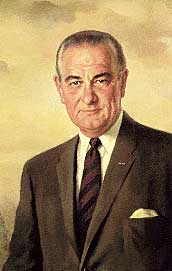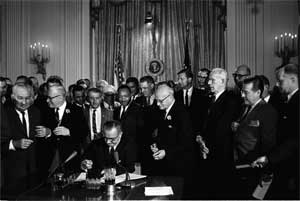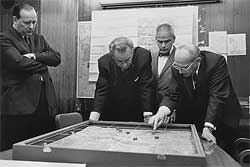Lyndon Baines Johnson was the thirty-sixth US President (1963-69) and the first President elected from a Southern state since before the Civil War. He succeeded to the presidency after the assassination of John Kennedy on November 22,1963.

Born August 27, 1908, near Johnson City, Texas, he was the son of Sam Ealy Johnson Jr., a struggling Texas farmer. The senior Johnson had also served for five terms as a Texas legislator. Lyndon's mother made her children's education a top priority, and it is said that she had a great influence on her famous son. Lyndon Johnson went to the public schools in Johnson City, Texas. Upon graduating, Lyndon headed out west to "find himself," at various points picking fruit, washing cars, and working in restaurants. Three years later, he went on to college and received a BS degree in Education from Southwest Texas State Teacher's College. After graduating, he taught school.

 He had just begun his second year teaching when in 1931, Democratic Congressman Richard Kleberg asked him to come to Washington as his congressional aid. During the next two terms, Lyndon began to develop a network of political contacts in Washington. It was also during this time that on November 17, l934, he married Claudia Alta Taylor, who he called "Lady Bird." She was an affectionate and gentile Southern woman who was her husband's helpmate and confidant, though, unlike Eleanor Roosevelt, she remained quietly in the background. Her warmth earned her much respect and affection from the American people. He had just begun his second year teaching when in 1931, Democratic Congressman Richard Kleberg asked him to come to Washington as his congressional aid. During the next two terms, Lyndon began to develop a network of political contacts in Washington. It was also during this time that on November 17, l934, he married Claudia Alta Taylor, who he called "Lady Bird." She was an affectionate and gentile Southern woman who was her husband's helpmate and confidant, though, unlike Eleanor Roosevelt, she remained quietly in the background. Her warmth earned her much respect and affection from the American people.
In 1935, when Lyndon was twenty-seven, Franklin Roosevelt appointed him the head of the National Youth Administration in Texas, a position he held until 1937. This youth group sought to bring the importance of education to the young of Texas and train them for meaningful employment. Johnson was in awe of Franklin Roosevelt and became enamored with his liberal reforms. During his own presidency, he would look back on the Roosevelt administration and use it as a model.
In 1937, Lyndon Johnson was elected to the United States House of Representatives, where he continued the liberal reform actions proposed by Franklin Roosevelt. Later in his life he would move politically to the right and show a more conservative side, but as a young man, Lyndon was a liberal. He left Congress for a short time in 1941 and 1942 to serve a term of active duty in the Navy, where he was stationed in the Pacific until Roosevelt recalled all members of Congress to Washington.
After the war, Lyndon Johnson's politics grew more conservative, to the point where he even voted against Civil Rights legislation. In 1948 he ran for the Senate, barely winning. The election was so close that his opponent challenged the results in the Texas courts, but Johnson prevailed. In 1953 he became the Senate Democratic Leader, and the following year he was reelected to his Senate seat. When he returned to Washington this time, it was as the Senate Majority Leader, a post he continued to hold through the next six years, in spite of a serious heart attack in 1955.
As the Majority Leader, Lyndon perfected the art of politics that he'd learned from his father, Sam. He was an excellent listener and could compromise when the situation required it. He established friendships with many Senators on both sides of the aisle, which served him well in his years as President. The former liberal was able to hold the conservative Southern leaders together. He was also a friend of Eisenhower, though many in his own party disliked the warm relationship between the Democrat, Johnson, and the Republican President.
Johnson wanted to run for the presidency in 1960, but purposely held back, counting upon a second ballot. When John Kennedy took the nomination on the first ballot and offered Lyndon the Vice Presidential slot, Johnson accepted. It was assumed that the Senator from Massachusetts had the North in his hands. He needed Johnson to help win the South. That year the Democrats won the White House with one of the narrowest victories in any Presidential campaign in United States history.
Johnson was named by Kennedy to head the Committee on Equal Employment Opportunities. This gave Johnson a chance to use the skills that enabled him to work with African American leaders and other minorities. As Vice President he also had the chance to undertake missions abroad that broadened his knowledge of foreign policy.

 On November 22, l963, Lyndon Johnson was in the motorcade in Dallas, Texas behind President and Mrs. Kennedy when shots rang out. John Kennedy was dead, and Lyndon Johnson became the fourth Vice President to ascend to the office of Chief Executive after an assassination. Johnson took the Oath of Office aboard Air Force One with Mrs. Kennedy and Lady Bird on either side of him. The picture of Lyndon Johnson's swearing in next to the blood stained wife of a martyred President is one of the most famous in history. On November 22, l963, Lyndon Johnson was in the motorcade in Dallas, Texas behind President and Mrs. Kennedy when shots rang out. John Kennedy was dead, and Lyndon Johnson became the fourth Vice President to ascend to the office of Chief Executive after an assassination. Johnson took the Oath of Office aboard Air Force One with Mrs. Kennedy and Lady Bird on either side of him. The picture of Lyndon Johnson's swearing in next to the blood stained wife of a martyred President is one of the most famous in history.
Johnson termed his domestic program the "Great Society," and his term as President was one of the most fruitful legislative eras in United States history. President Johnson had the largest push of legislation since FDR. Before he left office, Congress had implemented 226 of his 252 legislative requests, upholding his reputation as a man who could get things done. Among his better known programs was his War on Poverty and a strong Civil Rights Act in 1964. Later he would go on to pass Medicare, which provided health services to the elderly and the disabled. He also established the Department of Housing and Urban Development (HUD). One of the most important acts was The Voting Rights Act of 1965, which suspended the literacy requirements that were often used to keep blacks from registering to vote. Also, In 1964, he prodded Congress into enacting an 11 billion dollar tax cut.
In 1964 he and his running mate Hubert Humphrey ran a very quiet election compared to that of the staunch "father of conservatism" Barry Goldwater of Arizona. Goldwater warned against American continuation in a war that was undeclared and not even legislated to be called a war. In 1964, Congress passed the Tonkin Gulf Resolution which gave Johnson authority to take any action necessary to protect US troops. Vietnam was one of Johnson's largest priorities, and even before Kennedy was buried, he ordered more military troops into Vietnam and an escalation of the action. Many say this was to build the economy through a wartime increase of manufacturing in the defense Industries. It was for Lyndon Johnson a costly war that would lead him to many sleepless nights. In a stubborn attempt to win the war, Johnson escalated it to the heights never dreamed of when Dwight Eisenhower first sent a team of advisors into the area.
 Lyndon Johnson's presidency was tarnished by increasingly strident public opposition to his policies in Southeast Asia. Because of the increasing criticism over our involvement in Vietnam; he did not seek reelection in 1968. Johnson was a tired man. There had been race riots in most of the major cities. Anti-war demonstrations that had begun as peace parades had grown to battles between police and young people. The Lyndon Johnson who made the announcement that he would not be running for reelection appeared to the country as a broken man. Lyndon Johnson's presidency was tarnished by increasingly strident public opposition to his policies in Southeast Asia. Because of the increasing criticism over our involvement in Vietnam; he did not seek reelection in 1968. Johnson was a tired man. There had been race riots in most of the major cities. Anti-war demonstrations that had begun as peace parades had grown to battles between police and young people. The Lyndon Johnson who made the announcement that he would not be running for reelection appeared to the country as a broken man.

Johnson had hopes that his Vice President would win the election for President, but Hubert Humphrey lost to Richard Nixon that year. Lyndon Johnson retired to his beloved ranch in Texas where he wrote his memoirs and supervised the building of his Presidential Library and a school of government at the University of Texas at Austin. The Johnson Space Center in Houston, Texas is named for him. On January 22, 1973, just five days before the Treaty ending the Vietnam War was signed, Lyndon Baines Johnson died in Texas, of a heart attack.
|

